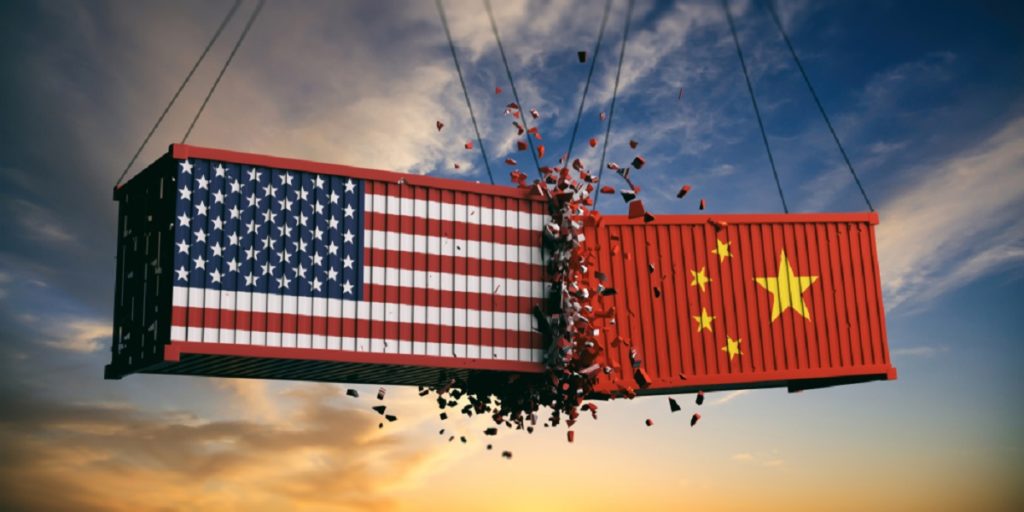 Back in April, I shared my thoughts with you about the theory and practice of trade wars. This was a hot topic that I was getting a lot of questions about, and I’d like to revisit it now that we’re a few months into trade negotiations.
Back in April, I shared my thoughts with you about the theory and practice of trade wars. This was a hot topic that I was getting a lot of questions about, and I’d like to revisit it now that we’re a few months into trade negotiations.
Specifically, one of the things that has people confused is the impact of tariffs on Chinese goods and the consequences of renegotiating the North American Free Trade Agreement (NAFTA).
Here’s my point of view on what’s going on and the potential impact on your portfolio.
What’s going on
A lot of the news has been focused on tariffs, which are important for a couple of reasons: first, they change the cost of the products you buy. If there are tariffs on Chinese imports, those imports will get more expensive for you. For businesses, tariffs can affect competitiveness and profitability, which can make business leaders look for alternative ways to manufacture and distribute their products.
So, when the US imposed tariffs on another $200 billion in Chinese goods on September 24, bringing new tariffs to a total of $250 billion, it was significant news. China retaliated with duties on another $60 billion in American products. If the US follows through on threats related to China’s retaliation, tariffs could be imposed on another $267 billion in goods, effectively covering all goods imported from China in 2017. In the meantime, China cancelled continuing trade talks, though both sides have indicated that they are “open” to it.
You could see that openness on September 26, when China walked back tariffs on several imports (without specifying whether they would apply to American imports) to spare Chinese consumers the threat of rising prices and to help offset an economic slowdown. In the face of the trade war, China has been facing a weaker stock market, while the US market has continued to rally.
On the Canadian side, the US and Canada made slow and difficult progress towards the US-imposed October 1 deadline to update NAFTA – late on September 30, the parties agreed to an updated framework for the agreement.
I think the negotiating process with Canada has exemplified something I said earlier in the year: that the point of all the hoopla is to create a stronger negotiating position. In this case, it seems to have work.
Uncertainty and politics
I believe the same thing is happening with negotiations with China: as the public, we see the political posturing, which is actually part of a larger discussion process. In my opinion, we’re likely to see a resolution with China, too.
In fact, I think better and more sustainable trade agreements are the whole point here. While there are, in my opinion, some problems with the way that we conduct trade with our global partners, on the whole there are gains to be had from having trading relationships. If we can structure those agreements to protect our economy from some of the risks of trade, I think we could be doing ourselves a good service.
Again, what we see in the meantime is the political posturing, the pointed public statements, and the bluffing of public disputes. We don’t really know what’s happening behind closed doors, but it’s my opinion that most of the people involved are hoping to get to a mutually beneficial resolution.
What happens next?
From where I’m sitting, the US is in a great position to negotiate right now because the economy is doing so well. Unemployment is low, consumer confidence is high, and we’re in the middle of a solid economic expansion.
I think that makes it a good time to revisit and revise trading relationships so that we can be on firm footing in the future.
Of course, it’s possible that whether or not the new tariffs stay, there will be short-term challenges and even market volatility. After all, any kind of change in the way that business is conducted will affect investment decisions, manufacturing locations, and any number of other variables.
For example, the ratings agency Fitch suggested that economic growth will slow in the coming year as a result of the trade dispute with China, and we could see other short-term headwinds as well.
But when and if an agreement is reached, I think we will unleash a lot of optimism. As most investors probably know, businesses like clarity – and once they get it, I can see both markets and the economy going higher.
In closing, I have to add an important disclaimer: I don’t have a crystal ball. What we know is what’s in the news and being shared publicly. But based on my experience and the way I’m analyzing the situation, I think there could be a lot of long-term positives from this volatile period. Let’s see what tomorrow brings.
Written by Bradford Pine with Anna B. Wroblewska
Sources:
https://www.cnbc.com/2018/09/23/risk-that-all-china-imports-could-see-new-tariffs-goldman-sachs.html
https://www.cbsnews.com/news/why-wall-street-is-ignoring-trumps-trade-war/
https://www.wsj.com/articles/china-announces-more-tariff-cuts-to-spur-spending-investment-1537967930
To learn about retirement savings, download my free eBook, “10 Tips You Need to Know About Your IRA Rollover.” This short book is packed with critical information that will help you make the right decisions about your retirement savings.
Written by Bradford Pine
Bradford Pine Wealth Group – New York City Financial Advisors
The views and opinions expressed in an article or column are the author’s own and not necessarily those of Cantella & Co., Inc. It was prepared for informational purposes only. It is not an official confirmation of terms. It is based on information generally available to the public from sources believed to be reliable but there is no guarantee that the facts cited in the foregoing material are accurate or complete.
Comments may not be representative of the experience of other investors. Investor comments and experiences are not indicative of future performance or results. Views and opinions expressed in the comments section are the author’s own and not those of Cantella & Co., Inc. No one posting a comment has been compensated for their opinions.


Comments are closed.